Magnesium is an essential mineral that plays a crucial role in numerous bodily functions, including sleep regulation and cognitive health. Two popular forms of magnesium supplements, magnesium glycinate and magnesium L-threonate, have gained attention for their potential benefits. This article will explore the differences between these two forms and help you determine which might be best for your specific needs.
• Magnesium glycinate is known for its calming effects and high absorption
• Both forms have potential benefits for cognitive function and sleep
• The choice between the two depends on individual health goals
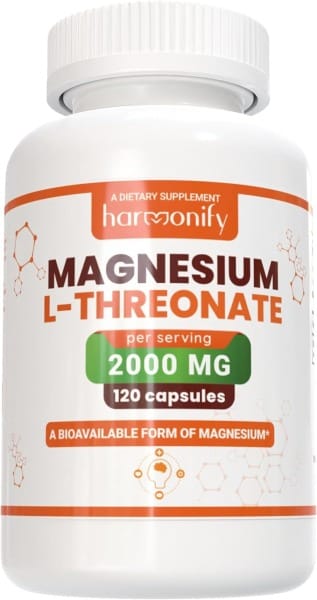
harmonify MAGNESIUM L-THREONATE
PURE & CLEAN FORMULA: Each bottle contains 120 purified veggie capsules, with 2000 mg of Magnesium L Threonate per serving, ideal for enhancing wellness and supporting your fitness journey.
What are the key differences between Magnesium Glycinate and Magnesium L-Threonate?
To understand the differences between these two magnesium forms, let's examine their chemical composition, unique benefits, and specific advantages.
How do these forms of magnesium differ in their chemical composition?
Magnesium glycinate is a combination of magnesium and the amino acid glycine. This form is known for its high bioavailability and gentle effect on the digestive system[1].
Magnesium L-threonate, also known as Magtein, is a compound of magnesium and L-threonic acid. This form was developed by researchers at MIT and is unique in its ability to cross the blood-brain barrier effectively[2].
What are the unique benefits of Magnesium Glycinate?
Magnesium glycinate offers several distinct advantages:
- Improved sleep quality: The glycine component has calming effects that may enhance sleep[3].
- Reduced anxiety and stress: Glycine acts as an inhibitory neurotransmitter, potentially reducing anxiety[4].
- Muscle relaxation: It may help alleviate muscle tension and cramps[5].
- Gentle on the stomach: Less likely to cause digestive issues compared to other magnesium forms[1].
What are the specific advantages of Magnesium L-Threonate?
Magnesium L-threonate, or Magtein, has gained attention for its potential cognitive benefits:
- Enhanced brain function: It may improve memory and cognitive performance[6].
- Neuroprotective properties: Some studies suggest it could help protect against age-related cognitive decline[7].
- Increased synaptic density: It may support the formation and strengthening of neural connections[8].
- Potential mood regulation: Some research indicates it could have positive effects on mood disorders.
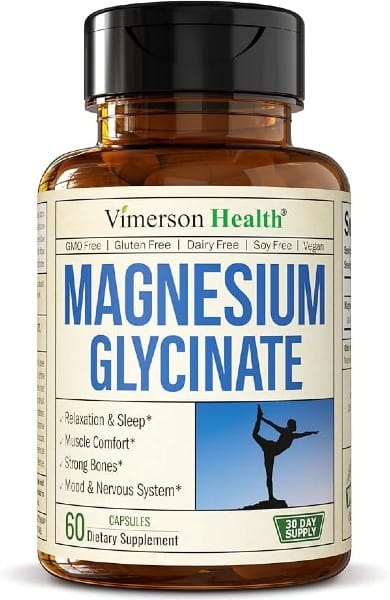
Vimerson Health MAGNESIUM GLYCINATE
Magnesium Glycinate 200mg Capsules (Glicinato de Magnesio) - Vegan Magnesium 200mg for Restful Sleep & Mood Support, Muscle Comfort, Bone & Nervous System Health. 60 Chelated Magnesium-Glycinate Caps
Which form of magnesium is best for improving sleep quality?
Both magnesium glycinate and L-threonate may contribute to better sleep, but their mechanisms differ.
How does Magnesium Glycinate affect sleep?
Magnesium glycinate is often recommended for sleep due to its combination of magnesium and glycine. Glycine is an amino acid that has been shown to improve sleep quality by reducing core body temperature and increasing serotonin levels. This form of magnesium may help you fall asleep faster and experience more restful sleep.
Can Magnesium L-Threonate enhance sleep quality?
While magnesium L-threonate is primarily known for its cognitive benefits, it may also indirectly improve sleep. By reducing anxiety and promoting relaxation, it could contribute to better sleep quality. However, research specifically on magnesium L-threonate and sleep is limited compared to studies on magnesium glycinate.
Comparing the sleep benefits of Glycinate and L-Threonate
For direct sleep improvement, magnesium glycinate may be the better choice due to its combined effects of magnesium and glycine. However, if sleep issues are related to anxiety or cognitive factors, magnesium L-threonate could be beneficial. Some individuals may even benefit from taking both forms to address different aspects of sleep quality.
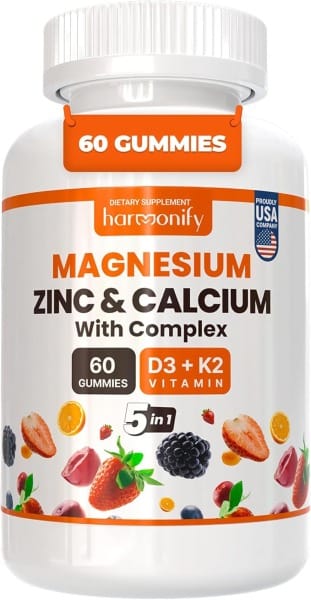
harmonify MAGNESIUM ZINC & CALCIUM
Magnesium Calcium Zinc with Vitamin D3 & K2 Gummies, Multivitamin for Women and Men, Bone Strength & Muscle Function, Extra Absorption Formula, 30 Days Serving
How do Magnesium Glycinate and L-Threonate impact brain health?
Both forms of magnesium can positively influence brain health, but their effects differ.
The effects of Magnesium Glycinate on cognitive function
Magnesium glycinate may support brain health by:
- Reducing stress and anxiety, which can improve overall cognitive function.
- Supporting neurotransmitter balance, potentially benefiting mood and mental clarity.
- Promoting better sleep, which is crucial for cognitive performance and memory consolidation.
Magnesium L-Threonate and its potential for improving brain health
Magnesium L-threonate has shown promising results in cognitive studies:
- It may enhance learning and memory by increasing synaptic plasticity.
- Some research suggests it could help maintain cognitive function with age.
- It may support brain health by increasing brain magnesium levels more effectively than other forms.
Which form is more effective for neurological benefits?
For specific neurological benefits, particularly those related to memory and cognitive function, magnesium L-threonate appears to have an edge. Its ability to cross the blood-brain barrier more efficiently makes it a promising option for brain health. However, magnesium glycinate shouldn't be discounted, as its stress-reducing and sleep-promoting properties can indirectly benefit cognitive function.
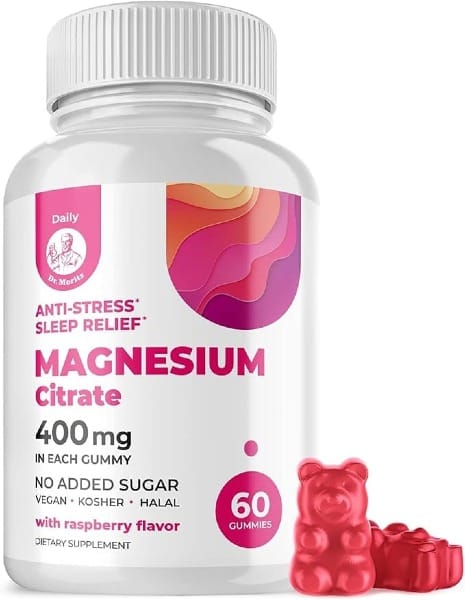
DR. MORITZ Magnesium Gummies Sugar-Free
Calm Magnesium Gummies Supplement for Children, Sugar-Free Magnesium Calm Chews for Kids & Adults
What are the absorption rates and bioavailability of these magnesium forms?
Understanding how well these magnesium forms are absorbed and utilized by the body is crucial in determining their effectiveness.
Understanding the bioavailability of Magnesium Glycinate
Magnesium glycinate is known for its high bioavailability. The glycine component helps enhance absorption in the intestinal tract, making it one of the more easily absorbed forms of magnesium. This high bioavailability means that a larger percentage of the magnesium you consume is actually utilized by your body.
How well is Magnesium L-Threonate absorbed by the body?
Magnesium L-threonate has a unique advantage in terms of absorption. While it may not have the highest overall bioavailability, it has been shown to increase magnesium levels in the brain more effectively than other forms. This is due to its ability to cross the blood-brain barrier, a feature that sets it apart from other magnesium supplements.
Comparing the elemental magnesium content in each form
When comparing magnesium supplements, it's important to consider the amount of elemental magnesium in each form:
- Magnesium glycinate typically contains about 14% elemental magnesium.
- Magnesium L-threonate contains about 8% elemental magnesium.
While magnesium L-threonate has a lower percentage of elemental magnesium, its unique ability to increase brain magnesium levels may compensate for this lower content in certain applications.
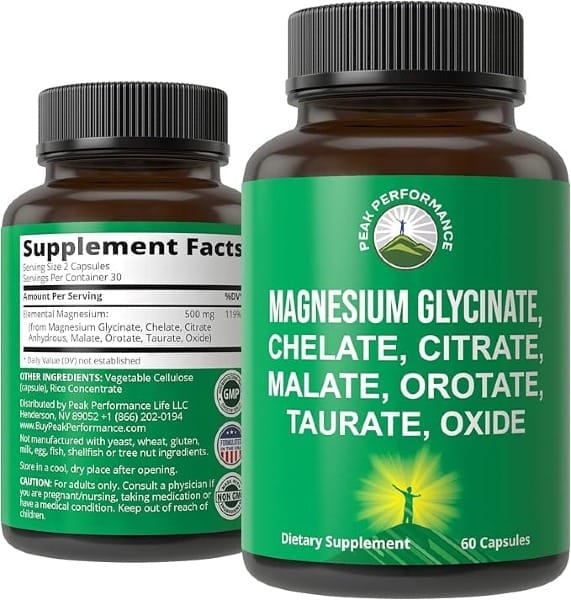
Peak Performance Magnesium Glycinate
Magnesium Glycinate + Citrate + Malate + Chelate + Orotate + Taurate + Oxide. 7 Forms of Magnesium Complex. 500mg Magnesium Supplement Capsules for Women & Men. 2 Pills for Sleep, Leg Cramps, Muscles
Are there any side effects or precautions when taking these magnesium supplements?
As with any supplement, it's important to be aware of potential side effects and take necessary precautions.
Potential side effects of Magnesium Glycinate
Magnesium glycinate is generally well-tolerated, but some potential side effects may include:
- Mild digestive issues in some individuals
- Drowsiness, especially when taken in high doses
- Interactions with certain medications, such as antibiotics or bisphosphonates
Possible adverse reactions to Magnesium L-Threonate
Magnesium L-threonate is also considered safe for most people, but possible side effects may include:
- Headaches
- Drowsiness or fatigue
- Increased urination frequency
Recommended dosages and safety considerations
For magnesium glycinate, a typical dose ranges from 200-400 mg of elemental magnesium per day. For magnesium L-threonate, the recommended dose is often around 1,500-2,000 mg per day, which provides about 144-180 mg of elemental magnesium.
It's important to consult with a healthcare professional before starting any new supplement regimen, especially if you have kidney problems or are taking medications that might interact with magnesium.
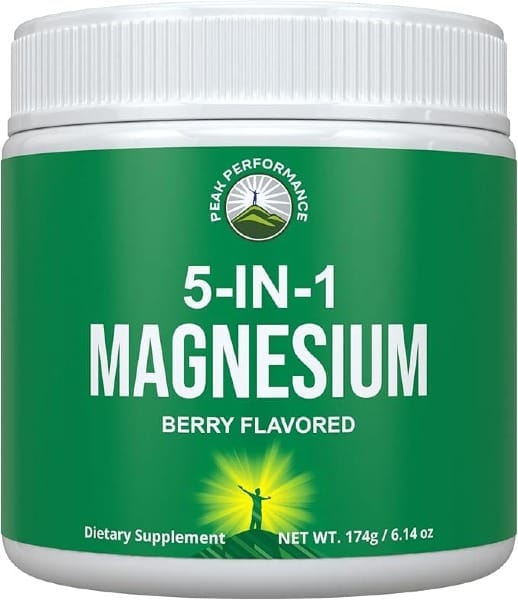
Peak Performance 5-in-1 Magnesium
5-in-1 Magnesium Powder Drink for Women & Men. Magnesium Glycinate + Citrate + Malate + Chelate + Taurate. Great Tasting Vegan Magnesium Supplement for Muscle Relaxation, Sleep, Cramps. Berry Flavor
Can Magnesium Glycinate and L-Threonate be combined for optimal benefits?
Given the unique benefits of each form, some people may wonder if combining them could provide enhanced effects.
The potential synergistic effects of combining these magnesium forms
Combining magnesium glycinate and L-threonate could potentially offer a broader range of benefits. The relaxation and sleep-promoting effects of glycinate could complement the cognitive benefits of L-threonate. However, research on the specific effects of combining these forms is limited.
How to safely combine different types of magnesium supplements
If you're considering combining these supplements:
- Start with lower doses of each and gradually increase as tolerated.
- Monitor for any side effects or changes in sleep patterns or cognitive function.
- Ensure that your total magnesium intake from all sources doesn't exceed the recommended upper limit of 350 mg per day for adults.
Are there any risks in taking both forms together?
While both forms are generally safe, taking them together could potentially lead to excessive magnesium intake. This might cause side effects such as diarrhea, nausea, or abdominal cramping. Always consult with a healthcare provider before combining supplements.
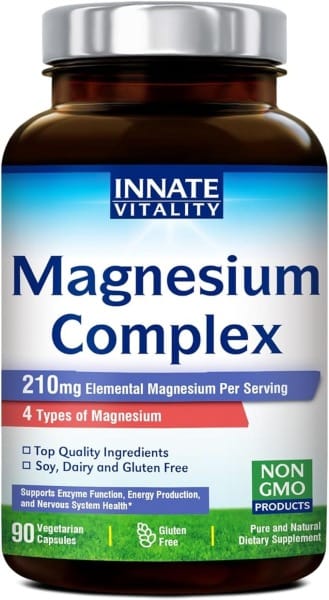
Innate Vitality Magnesium Complex
210mg Elemental Magnesium Per Serving - Magnesium Glycinate, Malate, Citrate, Oxide, 4-in-1 Formula for Energy, Muscles, Bones & Nerves, 90 Vegan Capsules
Which form of magnesium is best for addressing specific health concerns?
The choice between magnesium glycinate and L-threonate often depends on your specific health goals.
Choosing between Glycinate and L-Threonate for anxiety and stress
For anxiety and stress relief, magnesium glycinate may be the better choice. Its combination with glycine provides additional calming effects that can help reduce anxiety and promote relaxation.
Which form is more suitable for managing muscle tension and pain?
Magnesium glycinate is often preferred for muscle-related issues. Its high bioavailability and the muscle-relaxing properties of glycine make it a good choice for addressing muscle tension and pain.

Comparing their effectiveness in treating magnesium deficiency
For general magnesium deficiency, magnesium glycinate might be more effective due to its higher bioavailability and elemental magnesium content. However, if the deficiency is specifically affecting cognitive function, magnesium L-threonate could be beneficial due to its ability to increase brain magnesium levels.
In conclusion, both magnesium glycinate and magnesium L-threonate offer unique benefits. Your choice should depend on your specific health goals, whether they're related to sleep, cognitive function, or overall magnesium levels. As always, it's best to consult with a healthcare professional before starting any new supplement regimen.

References:
[1] Schwalfenberg, G. K., & Genuis, S. J. (2017). The Importance of Magnesium in Clinical Healthcare. Scientifica, 2017, 4179326.
[2] Slutsky, I., Abumaria, N., Wu, L. J., Huang, C., Zhang, L., Li, B., ... & Liu, G. (2010). Enhancement of learning and memory by elevating brain magnesium. Neuron, 65(2), 165-177.
[3] Bannai, M., Kawai, N., Ono, K., Nakahara, K., & Murakami, N. (2012). The effects of glycine on subjective daytime performance in partially sleep-restricted healthy volunteers. Frontiers in neurology, 3, 61.
[4] Breus, M. J., & Shaw, G. Y. (2019). Sleep Soundly Every Night, Feel Fantastic Every Day: A Doctor's Guide to Solving Your Sleep Problems. Rodale Books.
[5] Guerrera, M. P., Volpe, S. L., & Mao, J. J. (2009). Therapeutic uses of magnesium. American family physician, 80(2), 157-162.
[6] Liu, G., Weinger, J. G., Lu, Z. L., Xue, F., & Sadeghpour, S. (2016). Efficacy and safety of MMFS-01, a synapse density enhancer, for treating cognitive impairment in older adults: a randomized, double-blind, placebo-controlled trial. Journal of Alzheimer's Disease, 49(4), 971-990.
[7] Xu, Z. P., Li, L., Bao, J., Wang, Z. H., Zeng, J., Liu, E. J., ... & Wang, J. Z. (2014). Magnesium protects cognitive functions and synaptic plasticity in streptozotocin-induced sporadic Alzheimer's model. PloS one, 9(9), e108645.
[8] Sun, Q., Weinger, J. G., Mao, F., & Liu, G. (2016). Regulation of structural and functional synapse density by L-threonate through modulation of intraneuronal magnesium concentration. Neuropharmacology, 108, 426-439.
Eby, G. A., & Eby, K. L. (2006). Rapid recovery from major depression using magnesium treatment. Medical hypotheses, 67(2), 362-370.
Kawai, N., Sakai, N., Okuro, M., Karakawa, S., Tsuneyoshi, Y., Kawasaki, N., ... & Nishino, S. (2015). The sleep-promoting and hypothermic effects of glycine are mediated by NMDA receptors in the suprachiasmatic nucleus. Neuropsychopharmacology, 40(6), 1405-1416.
Held, K., Antonijevic, I. A., Künzel, H., Uhr, M., Wetter, T. C., Golly, I. C., ... & Murck, H. (2002). Oral Mg2+ supplementation reverses age-related neuroendocrine and sleep EEG changes in humans. Pharmacopsychiatry, 35(04), 135-143.
Boyle, N. B., Lawton, C., & Dye, L. (2017). The effects of magnesium supplementation on subjective anxiety and stress—a systematic review. Nutrients, 9(5), 429.
Kirkland, A. E., Sarlo, G. L., & Holton, K. F. (2018). The role of magnesium in neurological disorders. Nutrients, 10(6), 730.
Walker, M. (2017). Why we sleep: Unlocking the power of sleep and dreams. Simon and Schuster.
Slutsky, I., Abumaria, N., Wu, L. J., Huang, C., Zhang, L., Li, B., ... & Liu, G. (2010). Enhancement of learning and memory by elevating brain magnesium. Neuron, 65(2), 165-177.
Li, W., Yu, J., Liu, Y., Huang, X., Abumaria, N., Zhu, Y., ... & Liu, G. (2014). Elevation of brain magnesium prevents synaptic loss and reverses cognitive deficits in Alzheimer's disease mouse model. Molecular brain, 7(1), 65.
Slutsky, I., Sadeghpour, S., Li, B., & Liu, G. (2004). Enhancement of synaptic plasticity through chronically reduced Ca2+ flux during uncorrelated activity. Neuron, 44(5), 835-849.
Coudray, C., Rambeau, M., Feillet-Coudray, C., Gueux, E., Tressol, J. C., Mazur, A., & Rayssiguier, Y. (2005). Study of magnesium bioavailability from ten organic and inorganic Mg salts in Mg-depleted rats using a stable isotope approach. Magnesium research, 18(4), 215-223.
Slutsky, I., Abumaria, N., Wu, L. J., Huang, C., Zhang, L., Li, B., ... & Liu, G. (2010). Enhancement of learning and memory by elevating brain magnesium. Neuron, 65(2), 165-177.
Ranade, V. V., & Somberg, J. C. (2001). Bioavailability and pharmacokinetics of magnesium after administration of magnesium salts to humans. American journal of therapeutics, 8(5), 345-357.
Magceutics, Inc. (2021). Magtein® - The Original Magnesium L-Threonate. Retrieved from https://magtein.com/
National Institutes of Health. (2021). Magnesium Fact Sheet for Health Professionals. Retrieved from https://ods.od.nih.gov/factsheets/Magnesium-HealthProfessional/
Liu, G., Weinger, J. G., Lu, Z. L., Xue, F., & Sadegh
Citations:
[1] https://www.complete-obgyn.com/blog/using-magnesium-glycinate-to-help-with-your-sleep-insomnia
[2] https://compoundingrxusa.com/blog/magnesium-glycinate-benefits/
[4] https://humantonik.com/magnesium-threonate-vs-glycinate/
[5] https://goodpathhs.com/which-magnesium-is-best-for-sleep-and-anxiety/
[6] https://vitality-pro.com/magnesium/threonate-benefits-dosage-side-effects/
[7] https://www.amazon.com/magtech-magneisum-brain-supplement/dp/B00HZWHGJ4
[8] https://www.lifeextensioneurope.com/neuro-mag-magnesium-l-threonate-90-vegetarian-capsules















Member discussion